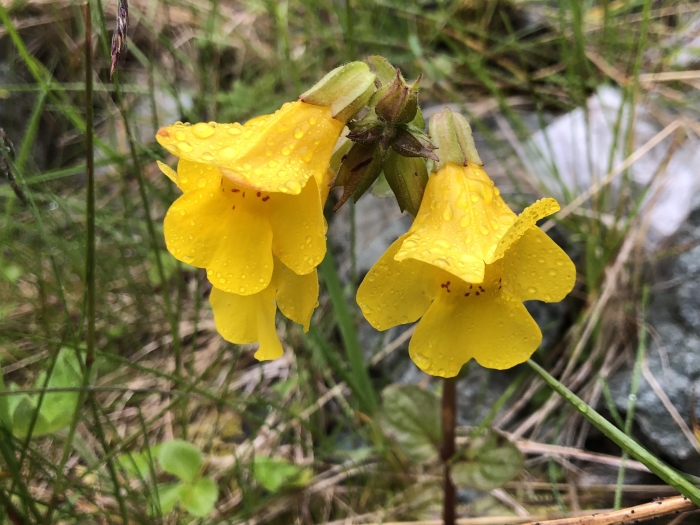Seep Monkeyflower
(Erythranthe guttata)
Seep Monkeyflower (Erythranthe guttata)
/
/

Jason Grant
CC BY 4.0
Image By:
Jason Grant
Recorded By:
Copyright:
CC BY 4.0
Copyright Notice:
Photo by: Jason Grant | License Type: CC BY 4.0 | License URL: http://creativecommons.org/licenses/by/4.0/ | Rights Holder: Jason Grant | Publisher: iNaturalist | Date Created: 2018-07-03T03:41:08Z |








































































Estimated Native Range
Summary
Erythranthe guttata, commonly known as Seep Monkeyflower, is a versatile plant that can be either an annual or perennial herb, depending on environmental conditions. It is native to moist habitats such as stream banks, seeps, and wet meadows in the Western United States, Western Canada, and Yukon. This plant typically grows from 10 to 80 centimeters tall and is characterized by its large, tubular, bright yellow flowers that are 2 to 4 cm long, which bloom from late spring to early summer. The flowers are highly attractive to bees and other pollinators.
Seep Monkeyflower is appreciated for its vibrant yellow flowers and its ability to thrive in wet environments, making it a suitable choice for water gardens, rain gardens, and areas with poor drainage. It is also used in naturalistic plantings and habitat restoration projects. While it prefers full sun, it can tolerate partial shade and requires high amounts of water. It adapts to a range of soil drainage conditions, from fast to slow. Gardeners should be cautious, as Erythranthe guttata can be potentially invasive outside its native range. It is important to consult local guidelines before planting to prevent ecological disruption.CC BY-SA 4.0
Seep Monkeyflower is appreciated for its vibrant yellow flowers and its ability to thrive in wet environments, making it a suitable choice for water gardens, rain gardens, and areas with poor drainage. It is also used in naturalistic plantings and habitat restoration projects. While it prefers full sun, it can tolerate partial shade and requires high amounts of water. It adapts to a range of soil drainage conditions, from fast to slow. Gardeners should be cautious, as Erythranthe guttata can be potentially invasive outside its native range. It is important to consult local guidelines before planting to prevent ecological disruption.CC BY-SA 4.0
Plant Description
- Plant Type: Herb
- Height: 0.5-2.5 feet
- Width: 0.1-0.5 feet
- Growth Rate: Rapid
- Flower Color: Yellow
- Flowering Season: Spring, Summer
- Leaf Retention: Deciduous
Growth Requirements
- Sun: Full Sun, Part Shade
- Water: High
- Drainage: Fast, Medium, Slow
Common Uses
Bee Garden, Bird Garden, Butterfly Garden, Hummingbird Garden, Low Maintenance, Showy Flowers, Water Garden
Natural Habitat
Moist habitats such as stream banks, seeps, and wet meadows
Other Names
Common Names: Common Monkeyflower, Large Yellow Monkeyflower, Common Yellow Monkeyflower, Spotted Monkeyflower, Yellow Monkeyflower, Common Monkey-Flower, Monkey-Flower, Mimule Jaune, Mimule Ponctué, Mimule Tacheté
Scientific Names: , Mimulus guttatus, Erythranthe guttata, Mimulus guttatus subsp. guttatus, Mimulus langsdorffii, Mimulus guttatus var. guttatus, Mimulus lyratus, Mimulus guttatus var. puberulus, Mimulus guttatus subsp. haidensis, Mimulus equinus
GBIF Accepted Name: Erythranthe guttata (DC.) G.L.Nesom